formerly eScholarship Editions


|
|
|
|
Your request for similar items found 20 book(s). | Modify Search | Displaying 1 - 20 of 20 book(s) | |
| 1. | 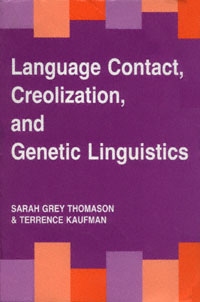 | Title: Language contact, creolization, and genetic linguistics Author: Thomason, Sarah Grey Published: University of California Press, 1992 Subjects: Language and Linguistics | Linguistic Theory | Cultural Anthropology Publisher's Description: Ten years of research back up the bold new theory advanced by authors Thomason and Kaufman, who rescue the study of contact-induced language change from the neglect it has suffered in recent decades. The authors establish an important new framework for the historical analysis of all degrees of conta . . . [more] Similar Items |
| 2. | 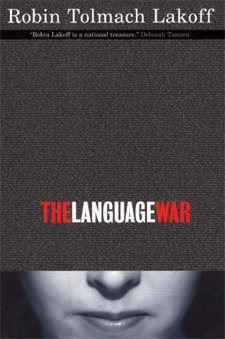 | Title: The language war Author: Lakoff, Robin Tolmach Published: University of California Press, 2000 Subjects: Language and Linguistics | Sociology | Literature | Media Studies Publisher's Description: Robin Lakoff gets to the heart of one of the most fascinating and pressing issues in American society today: who holds power and how they use it, keep it, or lose it. In a brilliant and vastly entertaining discussion of news events that have occupied an enormous amount of media space--political correctness, the Anita Hill/Clarence Thomas hearings, Hillary Rodham Clinton as First Lady, O. J. Simpson's murder trial, the Ebonics controversy, and the Clinton sex scandal--Lakoff shows that the struggle for power and status at the end of the century is being played out as a war over language. Controlling language is a basis for all power, she says, and therefore it is worth fighting for. As a result, newly emergent groups, especially blacks and women, are contending with middle- to upper-class white men for a share in "language rights." Lakoff's introduction to linguistic theories and the philosophy of language lays the groundwork for an exploration of news stories that meet what she calls the UAT (Undue Attention Test). As the stories became the subject of talk-show debates, late-night comedy routines, Web sites, and magazine articles, they were embroidered with additional meanings, depending on who was telling the story. Race, gender, or both are at the heart of these stories, and each one is about the right to construct meanings from languagein short, to possess power. Because language tells us how we are connected to one another, who has power and who does not, the stories reflect the language war. We use language to analyze what we call "reality," the author argues, but we mistrust how language is used today--witness the "politics of personal destruction" following the Clinton impeachment. Yet Lakoff sees in the struggle over language a positive goal: equality in the creation of our national discourse. Her writing is accessible and witty, and her excerpts from the media are used to great effect. [brief] Similar Items |
| 3. | 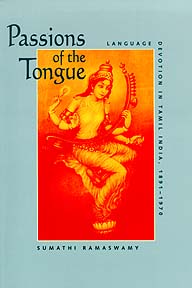 | Title: Passions of the tongue: language devotion in Tamil India, 1891-1970 Author: Ramaswamy, Sumathi Published: University of California Press, 1997 Subjects: Asian Studies | History | South Asia | Language and Linguistics | Asian History | Asian Literature Publisher's Description: Why would love for their language lead several men in southern India to burn themselves alive in its name? Passions of the Tongue analyzes the discourses of love, labor, and life that transformed Tamil into an object of such passionate attachment, producing in the process one of modern India's most intense movements for linguistic revival and separatism. Sumathi Ramaswamy suggests that these discourses cannot be contained within a singular metanarrative of linguistic nationalism and instead proposes a new analytic, "language devotion." She uses this concept to track the many ways in which Tamil was imagined by its speakers and connects these multiple imaginings to their experience of colonial and post-colonial modernity. Focusing in particular on the transformation of the language into a goddess, mother, and maiden, Ramaswamy explores the pious, filial, and erotic aspects of Tamil devotion. She considers why, as its speakers sought political and social empowerment, metaphors of motherhood eventually came to dominate representations of the language. [brief] Similar Items |
| 4. | 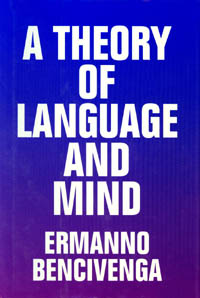 | Title: A theory of language and mind Author: Bencivenga, Ermanno 1950- Published: University of California Press, 1997 Subjects: Philosophy Publisher's Description: In his most recent book, Ermanno Bencivenga offers a stylistically and conceptually exciting investigation of the nature of language, mind, and personhood and the many ways the three connect. Bencivenga, one of the most iconoclastic voices to emerge in contemporary American philosophy, contests the basic assumptions of analytic (and also, to an extent, postmodern) approaches to these topics. His exploration leads through fascinating discussions of education, courage, pain, time and history, selfhood, subjectivity and objectivity, reality, facts, the empirical, power and transgression, silence, privacy and publicity, and play - all themes that are shown to be integral to our thinking about language. Relentessly bending the rules, Bencivenga frustrates our expectations of a "proper" theory of language. He invokes the transgressions of Nietzsche and Wittgenstein even as he appropriates the aphoristic style of Wittgenstein's Tractatus . Written in a philosophically playful and experimental mode, A Theory of Language and Mind draws the reader into a sense of continual surprise, therapeutic discomfort, and discovery. [brief] Similar Items |
| 5. | 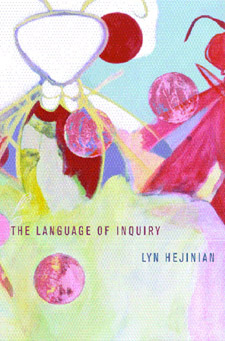 | Title: The language of inquiry Author: Hejinian, Lyn Published: University of California Press, 2000 Subjects: Literature | Poetry | Language and Linguistics Publisher's Description: Lyn Hejinian is among the most prominent of contemporary American poets. Her autobiographical poem My Life, a best-selling book of innovative American poetry, has garnered accolades and fans inside and outside academia. The Language of Inquiry is a comprehensive and wonderfully readable collection of her essays, and its publication promises to be an important event for American literary culture. Here, Hejinian brings together twenty essays written over a span of almost twenty-five years. Like many of the Language Poets with whom she has been associated since the mid-1970s, Hejinian turns to language as a social space, a site of both philosophical inquiry and political address. Central to these essays are the themes of time and knowledge, consciousness and perception. Hejinian's interests cover a range of texts and figures. Prominent among them are Sir Francis Bacon and Enlightenment-era explorers; Faust and Sheherazade; Viktor Shklovsky and Russian formalism; William James, Hannah Arendt, and Martin Heidegger. But perhaps the most important literary presence in the essays is Gertrude Stein; the volume includes Hejinian's influential "Two Stein Talks," as well as two more recent essays on Stein's writings. [brief] Similar Items |
| 6. | 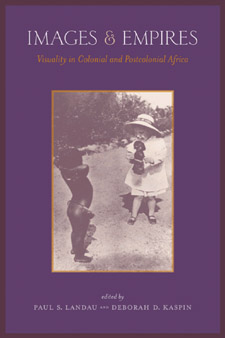 | Title: Images and empires: visuality in colonial and postcolonial Africa Author: Landau, Paul Stuart 1962- Published: University of California Press, 2002 Subjects: Anthropology | African Studies | Art History | Cultural Anthropology | History Publisher's Description: Figurative images have long played a critical, if largely unexamined, role in Africa - mediating relationships between the colonizer and the colonized, the state and the individual, and the global and the local. This pivotal volume considers the meaning and power of images in African history and culture. Paul S. Landau and Deborah Kaspin have assembled a wide-ranging collection of essays dealing with specific visual forms, including monuments, cinema, cartoons, domestic and professional photography, body art, world fairs, and museum exhibits. The contributors, experts in a number of disciplines, discuss various modes of visuality in Africa and of Africa, investigating the interplay of visual images with personal identity, class, gender, politics, and wealth. Integral to the argument of the book are over seventy contextualized illustrations. Africans saw foreigners in margarine wrappers, Tintin cartoons, circus posters, and Hollywood movies; westerners gleaned impressions of Africans from colonial exhibitions, Tarzan films, and naturalist magazines. The authors provide concrete examples of the construction of Africa's image in the modern world. They reveal how imperial iconographies sought to understand, deny, control, or transform authority, as well as the astonishing complexity and hybridity of visual communication within Africa itself. [brief] Similar Items |
| 7. | 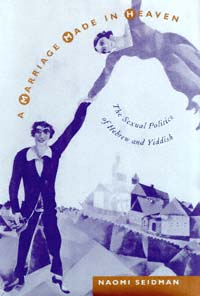 | Title: A marriage made in heaven: the sexual politics of Hebrew and Yiddish Author: Seidman, Naomi Published: University of California Press, 1997 Subjects: Jewish Studies | Gender Studies | Religion | Language and Linguistics Publisher's Description: With remarkably original formulations, Naomi Seidman examines the ways that Hebrew, the Holy Tongue, and Yiddish, the vernacular language of Ashkenazic Jews, came to represent the masculine and feminine faces, respectively, of Ashkenazic Jewish culture. Her sophisticated history is the first book-length exploration of the sexual politics underlying the "marriage" of Hebrew and Yiddish, and it has profound implications for understanding the centrality of language choices and ideologies in the construction of modern Jewish identity.Seidman particularly examines this sexual-linguistic system as it shaped the work of two bilingual authors, S.Y. Abramovitsh, the "grand-father" of modern Hebrew and Yiddish literature; and Dvora Baron, the first modern woman writer in Hebrew (and a writer in Yiddish as well). She also provides an analysis of the roles that Hebrew "masculinity" and Yiddish "femininity" played in the Hebrew-Yiddish language wars, the divorce that ultimately ended the marriage between the languages.Theorists have long debated the role of mother and father in the child's relationship to language. Seidman presents the Ashkenazic case as an illuminating example of a society in which "mother tongue" and "father tongue" are clearly differentiated. Her work speaks to important issues in contemporary scholarship, including the psychoanalysis of language acquisition, the feminist critique of Zionism, and the nexus of women's studies and Yiddish literary history. [brief] Similar Items |
| 8. | 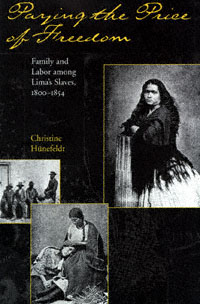 | Title: Paying the price of freedom: family and labor among Lima's slaves, 1800-1854 Author: Hünefeldt, Christine Published: University of California Press, 1995 Subjects: History | Anthropology | Latin American History | Latin American Studies Publisher's Description: Christine Hünefeldt documents in impressive, moving detail the striving and ingenuity, the hard-won triumphs and bitter defeats of slaves who sought liberation in nineteenth-century urban Peru. Drawing on judicial, ecclesiastical, and notarial records - including the testimony of the slaves themselves - she uncovers the various strategies slaves invented to gain their freedom.Hünefeldt pays particular attention to marriage relations and family life. Slaves used their family solidarity as a strategy, while slaveowners used the conflicts within families to prevent manumission. The author's focus on gender relations between slaveowners and slaves, as well as between slaves, is particularly original. Her eye for ethnographic detail and her perceptive reading of the documentary evidence make this book a rich and important contribution to the study of slavery in Latin America. [brief] Similar Items |
| 9. | 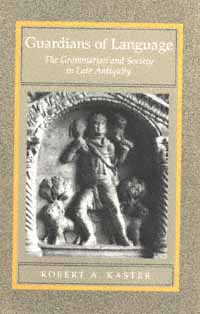 | Title: Guardians of language: the grammarian and society in late antiquity Author: Kaster, Robert A Published: University of California Press, 1997 Subjects: Classics | Classical Literature and Language | Language and Linguistics | Ancient History Publisher's Description: What did it mean to be a professional teacher in the prestigious "liberal schools" - the schools of grammar and rhetoric - in late antiquity? How can we account for the abiding prestige of these schools, which remained substantially unchanged in their methods and standing despite the political and religious changes that had taken place around them?The grammarian was a pivotal figure in the lives of the educated upper classes of late antiquity. Introducing his students to correct language and to the literature esteemed by long tradition, he began the education that confirmed his students' standing in a narrowly defined elite. His profession thus contributed to the social as well as cultural continuity of the Empire. The grammarian received honor - and criticism; the profession gave the grammarian a firm sense of cultural authority but also placed him in a position of genteel subordination within the elite.Robert A. Kaster provides the first thorough study of the place and function of these important but ambiguous figures. He also gives a detailed prosopography of the grammarians, and of the other "teachers of letters" below the level of rhetoric, from the middle of the third through the middle of the sixth century, which will provide a valuable research tool for other students of late-antique education. [brief] Similar Items |
| 10. | 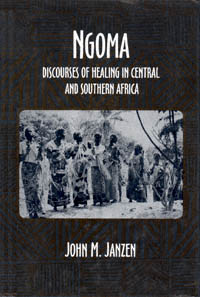 | Title: Ngoma: discourses of healing in central and southern Africa Author: Janzen, John M Published: University of California Press, 1992 Subjects: Anthropology | African Studies | Medical Anthropology Publisher's Description: Ngoma , in Bantu, means drum, song, performance, and healing cult or association. A widespread form of ritual healing in Central and Southern Africa, ngoma is fully investigated here for the first time and interpreted in a contemporary context. John Janzen's daring study incorporates drumming and spirit possession into a broader, institutional profile that emphasizes the varieties of knowledge and social forms and also the common elements of "doing ngoma ."Drawing on his recent field research in Kinshasa, Dar-es-Salaam, Mbabane, and Capetown, Janzen reveals how ngoma transcends national and social boundaries. Spoken and sung discourses about affliction, extended counseling, reorientation of the self or household, and the creation of networks that link the afflicted, their kin, and their healers are all central to ngoma - and familiar to Western self-help institutions as well. Students of African healing and also those interested in the comparative and historical study of medicine, religion, and music will find Ngoma a valuable and thought-provoking book. [brief] Similar Items |
| 11. | 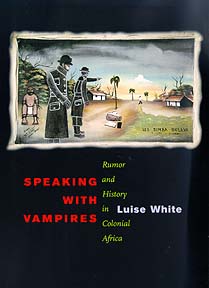 | Title: Speaking with vampires: rumor and history in colonial Africa Author: White, Luise Published: University of California Press, 2000 Subjects: African Studies | African History | African Studies | Cultural Anthropology Publisher's Description: During the colonial period, Africans told each other terrifying rumors that Africans who worked for white colonists captured unwary residents and took their blood. In colonial Tanganyika, for example, Africans were said to be captured by these agents of colonialism and hung upside down, their throats cut so their blood drained into huge buckets. In Kampala, the police were said to abduct Africans and keep them in pits, where their blood was sucked. Luise White presents and interprets vampire stories from East and Central Africa as a way of understanding the world as the storytellers did. Using gossip and rumor as historical sources in their own right, she assesses the place of such evidence, oral and written, in historical reconstruction. White conducted more than 130 interviews for this book and did research in Kenya, Uganda, and Zambia. In addition to presenting powerful, vivid stories that Africans told to describe colonial power, the book presents an original epistemological inquiry into the nature of historical truth and memory, and into their relationship to the writing of history. [brief] Similar Items |
| 12. | 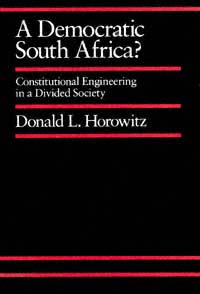 | Title: A democratic South Africa?: constitutional engineering in a divided society Author: Horowitz, Donald L Published: University of California Press, 1991 Subjects: Politics | African Studies | Sociology | Law Publisher's Description: Can a society as deeply divided as South Africa become democratic? In a most timely work, Donald L. Horowitz, author of the acclaimed Ethnic Groups in Conflict , points to the conditions that make democracy an improbable outcome in South Africa. At the same time, he identifies ways to overcome these obstacles, and he describes institutions that offer constitution makers the best chance for a democratic future.South Africa is generally considered an isolated case, a country unlike any other. Drawing on his extensive experience of racially and ethnically divided societies, however, Horowitz brings South Africa back into African and comparative politics. Experience gained in Nigeria, Botswana, Zimbabwe, and other divided societies around the world is relevant because, as South Africa leaves apartheid behind, it will still confront problems of pluralism: racial, ethnic, and ideological. Countries like South Africa, Horowitz argues, must develop institutions capable of coping with such divisions.Reviewing an array of constitutional proposals for South Africa - group rights, consociation, partition, binationalism, and an enhanced role for the judiciary - Horowitz shows that most are inappropriate for the country's problems, or else run afoul of some major ideological taboo. Institutions that are both apt and acceptable do exist, however. These are premised on the need to create incentives for accommodation across group lines. In the final chapter, Horowitz makes a major contribution to the theory of democratization as he considers how commitments to democracy might be extracted even from political groups with undemocratic objectives.Ranging skillfully across studies of social distance and stereotypes, electoral and party systems, constitutions and judiciaries, conflict and accommodation, and negotiation and democratization, Horowitz displays a broad comparative vision. His innovative study will change the way theorists and practitioners approach the task of making democracy work in difficult conditions. [brief] Similar Items |
| 13. | 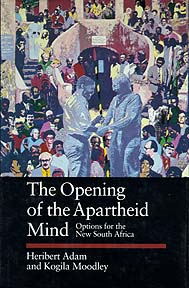 | Title: The opening of the Apartheid mind: options for the new South Africa Author: Adam, Heribert Published: University of California Press, 1993 Subjects: African Studies | Politics | African History Publisher's Description: Refusing to be governed by what is fashionable or inoffensive, Heribert Adam and Kogila Moodley frankly address the passions and rationalities that drive politics in post-apartheid South Africa. They argue that the country's quest for democracy is widely misunderstood and that public opinion abroad relies on stereotypes of violent tribalism and false colonial analogies.Adam and Moodley criticize the personality cult surrounding Nelson Mandela and the accolades accorded F. W. de Klerk. They reject the black-versus-white conflict and substitute sober analysis and strategic pragmatism for the moral outrage that typifies so much writing about South Africa. Believing that the best expression of solidarity emanates from sympathetic but candid criticism, they pose challenging questions for the African National Congress and Nelson Mandela. They give in-depth coverage to political violence, the ANC-South African Communist Party alliance, Inkatha, and other controversial topics as well.The authors do not propose a solution that will guarantee a genuinely democratic South Africa. What they offer is an understanding of the country's social conditions and political constraints, and they sketch options for both a new South Africa and a new post-Cold War foreign policy for the whole of southern Africa. The importance of this book is as immediate as today's headlines. [brief] Similar Items |
| 14. | 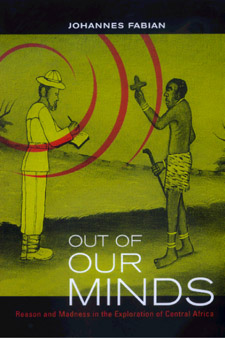 | Title: Out of our minds: reason and madness in the exploration of Central Africa: the Ad. E. Jensen lectures at the Frobenius Institut, University of Frankfurt Author: Fabian, Johannes Published: University of California Press, 2000 Subjects: Anthropology | African History | Cultural Anthropology Publisher's Description: Explorers and ethnographers in Africa during the period of colonial expansion are usually assumed to have been guided by rational aims such as the desire for scientific knowledge, fame, or financial gain. This book, the culmination of many years of research on nineteenth-century exploration in Central Africa, provides a new view of those early European explorers and their encounters with Africans. Out of Our Minds shows explorers were far from rational--often meeting their hosts in extraordinary states influenced by opiates, alcohol, sex, fever, fatigue, and violence. Johannes Fabian presents fascinating and little-known source material, and points to its implications for our understanding of the beginnings of modern colonization. At the same time, he makes an important contribution to current debates about the intellectual origins and nature of anthropological inquiry. Drawing on travel accounts--most of them Belgian and German--published between 1878 and the start of World War I, Fabian describes encounters between European travelers and the Africans they met. He argues that the loss of control experienced by these early travelers actually served to enhance cross-cultural understanding, allowing the foreigners to make sense of strange facts and customs. Fabian's provocative findings contribute to a critique of narrowly scientific or rationalistic visions of ethnography, illuminating the relationship between travel and intercultural understanding, as well as between imperialism and ethnographic knowledge. [brief] Similar Items |
| 15. | 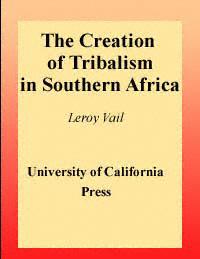 | Title: The Creation of tribalism in Southern Africa Author: Vail, Leroy Published: University of California Press, 1989 Subjects: History | African History | African Studies | Ethnic Studies Publisher's Description: Despite a quarter century of "nation building," most African states are still driven by ethnic particularism - commonly known as "tribalism." The stubborn persistence of tribal ideologies despite the profound changes associated with modernization has puzzled scholars and African leaders alike. The bloody hostilities between the tribally-oriented Zulu Inkhata movement and supporters of the African National Congress are but the most recent example of tribalism's tenacity. The studies in this volume offer a new historical model for the growth and endurance of such ideologies in southern Africa. [brief] Similar Items |
| 16. | 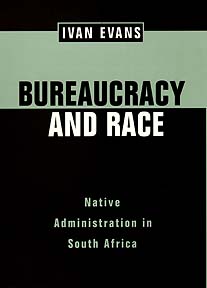 | Title: Bureaucracy and race: native administration in South Africa Author: Evans, Ivan Thomas 1957- Published: University of California Press, 1997 Subjects: African Studies | African History | Sociology | Postcolonial Studies | Cultural Anthropology Publisher's Description: Bureaucracy and Race overturns the common assumption that apartheid in South Africa was enforced only through terror and coercion. Without understating the role of violent intervention, Ivan Evans shows that apartheid was sustained by a great and ever-swelling bureaucracy. The Department of Native Affairs (DNA), which had dwindled during the last years of the segregation regime, unexpectedly revived and became the arrogant, authoritarian fortress of apartheid after 1948. The DNA was a major player in the prolonged exclusion of Africans from citizenship and the establishment of a racially repressive labor market. Exploring the connections between racial domination and bureaucratic growth in South Africa, Evans points out that the DNA's transformation of oppression into "civil administration" institutionalized and, for whites, legitimized a vast, coercive bureaucratic culture, which ensnared millions of Africans in its workings and corrupted the entire state. Evans focuses on certain features of apartheid - the pass system, the "racialization of space" in urban areas, and the cooptation of African chiefs in the Bantustans - in order to make it clear that the state's relentless administration, not its overtly repressive institutions, was the most distinctive feature of South Africa in the 1950s. All observers of South Africa past and present and of totalitarian states in general will follow with interest the story of how the Department of Native Affairs was crucial in transforming "the idea of apartheid" into a persuasive - and all too durable - practice. [brief] Similar Items |
| 17. | 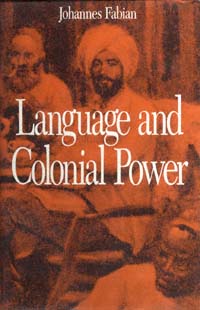 | Title: Language and colonial power: the appropriation of Swahili in the former Belgian Congo, 1880-1938 Author: Fabian, Johannes Published: University of California Press, 1991 Subjects: Postcolonial Studies | Cultural Anthropology | Language and Linguistics | African History | African Studies Similar Items |
| 18. | 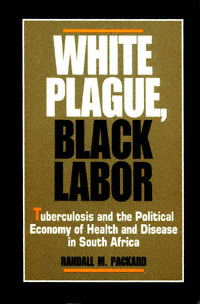 | Title: White plague, black labor: tuberculosis and the political economy of health and disease in South Africa Author: Packard, Randall M 1945- Published: University of California Press, 1989 Subjects: Anthropology | Medicine | Medical Anthropology | African Studies | Politics Publisher's Description: Why does tuberculosis, a disease which is both curable and preventable, continue to produce over 50,000 new cases a year in South Africa, primarily among blacks? In answering this question Randall Packard traces the history of one of the most devastating diseases in twentieth-century Africa, against the background of the changing political and economic forces that have shaped South African society from the end of the nineteenth century to the present. These forces have generated a growing backlog of disease among black workers and their families and at the same time have prevented the development of effective public health measures for controlling it. Packard's rich and nuanced analysis is a significant contribution to the growing body of literature on South Africa's social history as well as to the history of medicine and the political economy of health. [brief] Similar Items |
| 19. | 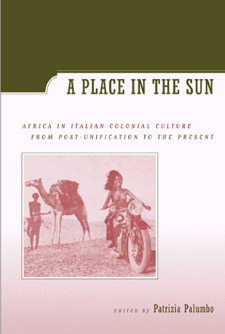 | Title: A place in the sun: Africa in Italian colonial culture from post-unification to the present Author: Palumbo, Patrizia Published: University of California Press, 2003 Subjects: History | Postcolonial Studies | European History | African History | Immigration Publisher's Description: Given the centrality of Africa to Italy's national identity, a thorough study of Italian colonial history and culture has been long overdue. Two important developments, the growth of postcolonial studies and the controversy surrounding immigration from Africa to the Italian peninsula, have made it clear that the discussion of Italy's colonial past is essential to any understanding of the history and construction of the nation. This collection, the first to gather articles by the most-respected scholars in Italian colonial studies, highlights the ways in which colonial discourse has pervaded Italian culture from the post-unification period to the present. During the Risorgimento, Africa was invoked as a limb of a proudly resuscitated Imperial Rome. During the Fascist era, imperialistic politics were crucial in shaping both domestic and international perceptions of the Italian nation. These contributors offer compelling essays on decolonization, exoticism, fascist and liberal politics, anthropology, and historiography, not to mention popular literature, feminist studies, cinema, and children's literature. Because the Italian colonial past has had huge repercussions, not only in Italy and in the former colonies but also in other countries not directly involved, scholars in many areas will welcome this broad and insightful panorama of Italian colonial culture. [brief] Similar Items |
| 20. | 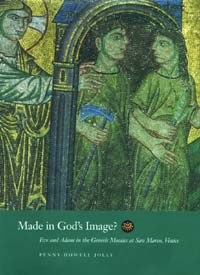 | Title: Made in God's image?: Eve and Adam in the Genesis mosaics at San Marco, Venice Author: Jolly, Penny Howell Published: University of California Press, 1997 Subjects: Art | Art History | Medieval Studies | Women's Studies | Religion Publisher's Description: The stunning mosaics that illustrate the story of Creation in the church of San Marco in Venice are the focus of Penny Howell Jolly's compelling and provocative book. Scholars of medieval art have long been interested in the Genesis mosaics because they copy a nearly destroyed fifth-century illuminated Greek manuscript known as the Cotton Genesis. But instead of seeing the mosaics as a vehicle for reconstructing a lost cycle of paintings, Jolly presents them as a social document revealing the essential misogyny that existed in thirteenth-century Venice. Jolly analyzes more than twenty scenes, one by one in narrative order, and her perceptive reading goes well beyond what the Genesis Vulgate text says about Eve and Adam. The mosaics establish Eve as the culpable character from the very moment of her Creation, says Jolly, and depict her as dangerous and unrepentant at the end. Incorporating both feminist religious and narratological studies, Jolly poses important questions on the nature of visual language as opposed to verbal language. The very ability of visual forms to recall a rich variety of references is one source of their power, and propaganda must have enough breadth of reference to be read by diverse groups. The San Marco cupola, Jolly maintains, is dealing in powerful propaganda, and her pictorial observations offer an articulate and refreshing new view of this well-known work. [brief] Similar Items |